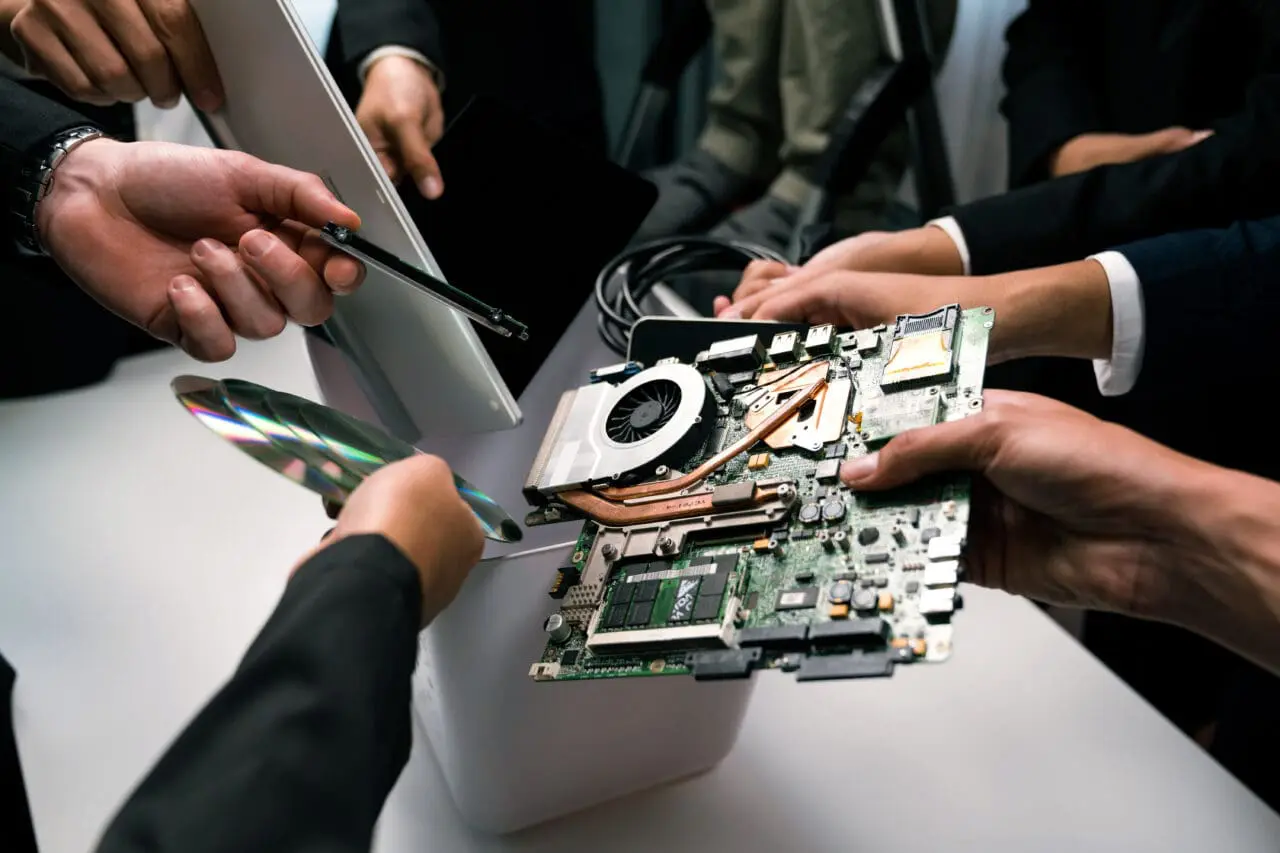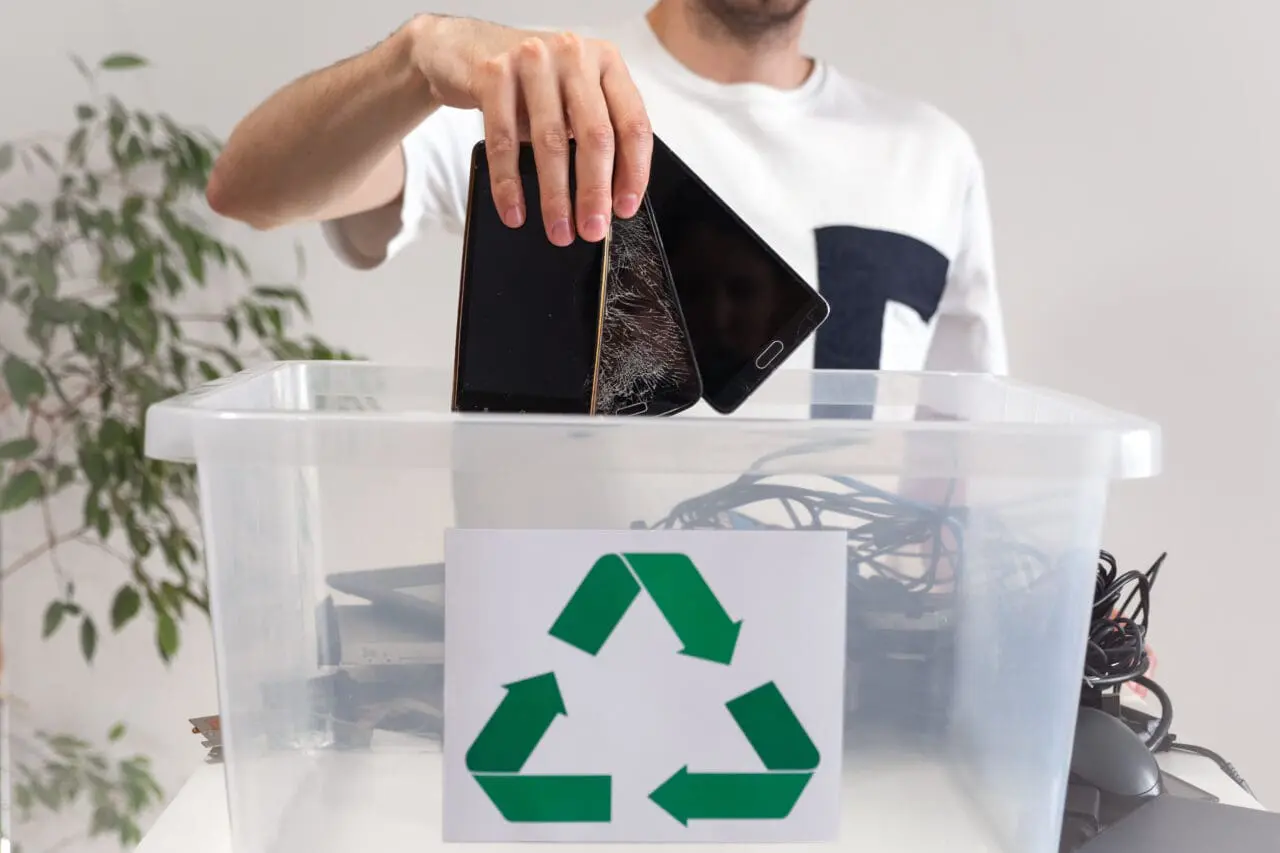

The intersection of cheesemaking and E-waste recycling may seem unlikely at first, but groundbreaking research by ETH Zurich has revealed a novel method. It utilises byproducts from cheesemaking to recover gold from electronic waste, addressing toxic substances in the recycling process. This innovative approach not only offers a cost-effective solution but also promotes sustainability in gold recovery. With an estimated seven percent of the world’s gold trapped in E-waste, this technique has the potential to revolutionise how we recycle E-waste. By leveraging everyday byproducts, this method could significantly help in tackling the global E-waste challenge, taking us closer to a more sustainable and circular economy.
ETH Zurich researchers are leading the way in tackling the global issue of recycling e-waste, including electronic equipment like mobile phones, by utilising an unexpected ally: cheese. By harnessing the byproducts of cheesemaking, they’ve devised an innovative technique to extract gold from E-waste. This advancement not only highlights a fresh approach to recovering valuable metals but also emphasises the untapped potential within our growing e-waste stockpiles. With approximately seven percent of the world’s gold trapped in discarded electronics, this pioneering study could significantly transform our e-waste recycling efforts, offering an economically feasible and environmentally sustainable solution. In light of this, the initiatives by ETH Zurich represent a vital stride towards achieving a circular economy, where waste isn’t viewed as a dead-end but as the start of a new, valuable lifecycle that impacts human health positively.
The utilisation of cheesemaking byproducts in the recovery of precious metals from E-waste extends beyond gold. This method, developed by researchers at ETH Zurich, can also extract silver and other valuable metals, broadening its application and enhancing the sustainability of E-waste recycling efforts. In addition to reducing toxic substances and hazardous waste, this innovative approach can revolutionise the value chain in the e-waste recycling process. By offering a cost-effective and eco-friendly alternative to traditional metal recovery techniques, it has the potential to significantly impact the global challenge of E-waste, promoting a shift towards more sustainable and circular economy practices, particularly in the recovery of ferrous metals.
The escalating issue of electronic waste (E-waste) poses a significant challenge on a global scale. With technological advancements leading to the rapid turnover of electrical and electronic equipment, E-waste has emerged as a critical environmental and health concern. Currently, an estimated seven percent of the world’s gold is entombed within E-waste, reflecting just a fraction of the valuable materials that remain largely untapped due to inefficient recycling processes. The pursuit of innovative recycling techniques, such as the pioneering method developed by ETH Zurich researchers using cheesemaking byproducts for metal recovery, illuminates the path towards reducing the E-waste burden. This approach underscores the importance of adopting sustainable and circular economy principles to not only reclaim precious resources but also mitigate the adverse effects of E-waste on our planet.
Quite Good is leading the way in tackling the rising concern of e-waste recycling, particularly focusing on mobile phones. Their approach is multifaceted, involving innovation, education, and advocating for a circular economy. Viewing e-waste not as a discarded product but as a valuable resource, Quite Good utilises innovative methods like recovering precious metals from e-waste with byproducts from cheesemaking. This sustainable technique, developed through research at ETH Zurich, offers a cost-effective solution while reducing the environmental impact of toxic materials in waste electrical. By integrating these forward-thinking strategies with educational initiatives, Quite Good empowers individuals and communities to engage actively in combating e-waste, supporting a more sustainable, circular economy that minimises waste and maximises resources in the fastest-growing waste stream while also considering human health.
In the battle against the mounting global E-waste crisis, effective recycling of e-waste is crucial. Partnerships between academic institutions, like ETH Zurich, and innovative organisations, such as Quite Good, highlight the significant impact of joint ventures in pioneering sustainable solutions. These alliances not only enhance E-waste management strategies but also drive the development of novel recycling technologies. By uniting cutting-edge research on recycling e-waste, including hazardous materials found in circuit boards, with robust education and advocacy efforts, partnerships are paving the way towards a more sustainable and circular economy. This holistic approach demonstrates that diverse entities coming together can create impactful, long-lasting solutions using recycled raw materials.
In the collective effort to combat the escalating challenge of recycling e-waste, individual actions play a crucial role. By engaging in volunteering and making donations, each person can contribute significantly to the reduction of e-waste. Volunteering with organisations like Quite Good offers the opportunity to participate directly in initiatives aimed at e-waste reduction, including educational programmes that raise awareness about sustainable and circular economy practices. Furthermore, donating your used mobile phones and cathode ray tubes to reputable recycling programs ensures that valuable materials, such as those that can be recovered using innovative methods like the cheesemaking byproduct technique developed at ETH Zurich, are not lost to the waste stream. Together, these personal contributions support the larger vision of a circular economy, where every piece of waste electrical products is seen not as trash, but as a treasure trove of resources waiting to be recovered and reused.
Staying up to date with the latest advancements in E-waste management is vital for promoting innovation and sustainability in today’s swiftly changing technological landscape. The innovative work of institutions like ETH Zurich, in collaboration with organisations such as Quite Good, underscores the dynamic nature of the field and its potential for significant environmental and human health impact. By engaging with new research, methods, and collaborative strategies for recycling E-waste, including the innovative use of cheesemaking byproducts, individuals and organisations can contribute to a more sustainable future. This involvement not only sparks inspiration but also empowers action, propelling the global transition towards a circular economy where E-waste, including mobile phones and other electronic devices, is valued not as waste but as a resource ripe for reclamation and reuse, particularly valuable for recovering ferrous metals. Placing a focus on incorporating recycling bins for E-waste disposal can further enhance these efforts.
Joining Quite Good’s mission propels us towards a greener, more sustainable future by addressing the surging challenge of electronic waste (E-waste) head-on. By harnessing innovative recycling technologies, such as the breakthrough method of recovering precious metals from electronic and electrical equipment (EEE) using cheesemaking byproducts pioneered by ETH Zurich, Quite Good is reshaping how we perceive and manage E-waste and circuit boards. This approach not only conserves valuable resources but also significantly lessens the environmental harm caused by traditional disposal methods. Beyond technological innovation, Quite Good emphasises the power of community through education and collaborative efforts in the e-waste recycling process, demonstrating that a collective commitment to reducing E-waste and electronic recycling can indeed foster a circular economy. By supporting Quite Good, whether through volunteering, educating, or donating, you become an integral part of a vitally important environmental cause, contributing to the preservation of our planet for future generations.

This website uses cookies to improve your experience. Choose what you're happy with.
Required for the site to function and can't be switched off.
Help us improve the website. Turn on if you agree.
Used for ads and personalisation. Turn on if you agree.
This website uses cookies to improve your experience. Choose what you're happy with.
Required for the site to function and can't be switched off.
Help us improve the website. Turn on if you agree.
Used for ads and personalisation. Turn on if you agree.